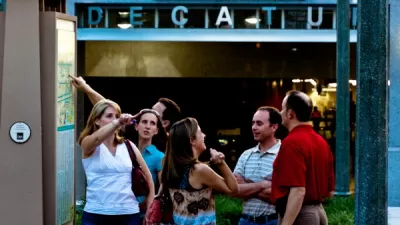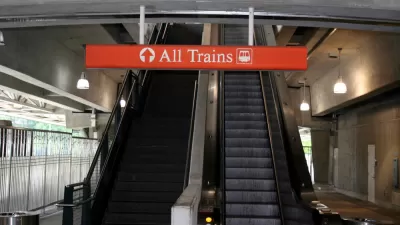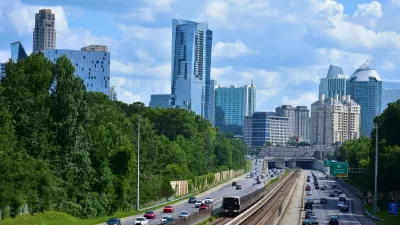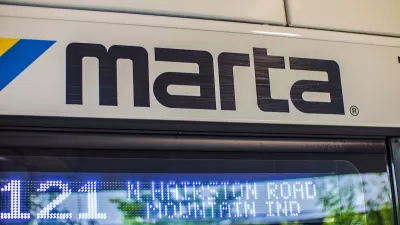The results of a new poll conducted for The Atlanta Journal-Constitution show that even in a notoriously sprawling metro (and perhaps more so), transit riders have a stronger connection to their neighborhoods and the larger region.

A poll conducted by SRBI of residents in 10 Georgia counties has found that 51 percent of those who'd ridden Atlanta's transit service (MARTA) at least once in the past six months said they had a strong connection to the Atlanta region, versus 23 percent of nonriders. "In addition, 72 percent of riders had a strong connection to their neighborhood versus 64 percent of nonriders. A total of 64 percent of transit riders felt a strong connection to the county where they reside, as opposed to 55 percent of nonriders," report Craig Schneider and Steve Visser.
"The poll results raise provocative questions as to the value of the transit service beyond getting tens of thousands of people to work each day. Do people have a deeper connection to community because they ride transit? Or do they ride transit because they already have that deeper connection?" According to the authors, "Experts said there’s little research on whether or transit riders feel more connected to their communities."
"Jana Lynott, a transportation analyst for the American Association of Retired Persons, said many people who take transit have an 'urbanist' point of view, meaning they already view themselves as tightly bound up in the region’s social fabric."
"Traveling the transit lines can enhance a rider’s appreciation for their surroundings, said Cynthia Hewitt, an associate professor of sociology at Morehouse College. 'You interact and share space with more people, and that makes you feel a part of the community,' she said."
FULL STORY: Poll: MARTA riders have stronger connection than nonriders to Atlanta region

Alabama: Trump Terminates Settlements for Black Communities Harmed By Raw Sewage
Trump deemed the landmark civil rights agreement “illegal DEI and environmental justice policy.”

Planetizen Federal Action Tracker
A weekly monitor of how Trump’s orders and actions are impacting planners and planning in America.

The 120 Year Old Tiny Home Villages That Sheltered San Francisco’s Earthquake Refugees
More than a century ago, San Francisco mobilized to house thousands of residents displaced by the 1906 earthquake. Could their strategy offer a model for the present?

In Both Crashes and Crime, Public Transportation is Far Safer than Driving
Contrary to popular assumptions, public transportation has far lower crash and crime rates than automobile travel. For safer communities, improve and encourage transit travel.

Report: Zoning Reforms Should Complement Nashville’s Ambitious Transit Plan
Without reform, restrictive zoning codes will limit the impact of the city’s planned transit expansion and could exclude some of the residents who depend on transit the most.

Judge Orders Release of Frozen IRA, IIJA Funding
The decision is a victory for environmental groups who charged that freezing funds for critical infrastructure and disaster response programs caused “real and irreparable harm” to communities.
Urban Design for Planners 1: Software Tools
This six-course series explores essential urban design concepts using open source software and equips planners with the tools they need to participate fully in the urban design process.
Planning for Universal Design
Learn the tools for implementing Universal Design in planning regulations.
Clanton & Associates, Inc.
Jessamine County Fiscal Court
Institute for Housing and Urban Development Studies (IHS)
City of Grandview
Harvard GSD Executive Education
Toledo-Lucas County Plan Commissions
Salt Lake City
NYU Wagner Graduate School of Public Service





























